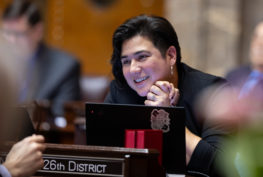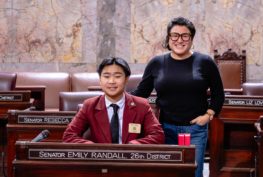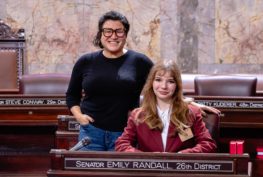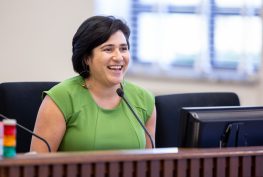OLYMPIA – Sen. Emily Randall, D-Bremerton, and Rep. Vandana Slatter, D-Bellevue, chair the Senate and House Higher Education & Workforce Development committees. In the wake of the Supreme Court decision striking down affirmative action protections in college admissions, overturning almost 50 years of precedent and the ruling against the Department of Education’s plan to forgive roughly $500 billion in student loan debt, Chairs Randall and Slatter issued the following joint statement:
“Yet again, the U.S. Supreme Court ruled against the best interest of everyday people. The decisions in Biden v. Nebraska and SFFA v. Harvard will have a devastating impact on our efforts to provide equitable access to post-secondary education and meet workforce demands. In Washington State, data has shown that historical and structural inequities continue to disproportionately limit the educational attainment of racial minorities. These rulings target first-generation students, and students from overburdened communities who strive to achieve economic stability, mobility, and prosperity. But setbacks at the federal level will not deter us from our commitment to expanding opportunities for all our neighbors to fully and equally participate in our workforce, and our communities to help build our economy. We remain determined to ensure any pathway people choose — whether it’s a college degree or an apprenticeship — is accessible, attainable, and supported.”
According to data in a 2022 Equity in Education Profile from the Washington Student Achievement Council, 52% of white individuals had a postsecondary credential, compared to only 38% of African Americans and 26% of Native Americans. A 2020 headcount at 4-year institutions further demonstrated an enrollment level of 47% for white students, but less than 3% for African American students, and only 0.5% for Native American Students. The enrollment gap perpetuates economic inequality for underrepresented communities since higher educational attainment is correlated with higher incomes and lower unemployment rates.
The issue of economic instability is further intensified when factoring in income levels. Postsecondary educational attainment is 85% for those who come from households that make over $100,000 per year compared to 34% of those who come from households that make less than $35,000 per year. As such, the data clearly indicate, that students from low-income families are less likely to participate in an educational system that is inaccessible, unaffordable, and will leave students with insurmountable debt hindering future economic stability.
Uplifting overburdened communities means making sure the door is open to all who seek an opportunity to contribute to the economy of tomorrow. We have made important strides in recent years to address the accessibility and affordability of higher education and vocational training – especially for communities of color.
In 2019, the Legislature established the Washington College Grant providing free public college tuition for families making up to 55% of the state median income (HB 2158) and created a pilot program to support students experiencing homelessness and food insecurity (SB 5800). During the 2021 legislative session, Democrats passed legislation to expand the Washington State Opportunity Scholarship (WSOS) for students attending community and technical colleges (HB 1425) and required all community and technical colleges to submit strategic plans for achieving diversity, equity, and inclusion on their campuses (SB 5194). During the same year, public medical schools were directed to develop a health equity curriculum for medical students and required schools to create a goal regarding student representation (SB 5228).
In 2023, the Washington College Grant was expanded to include a higher state median income and retain bridge grants for life needs. The College Bound Scholarship was expanded by removing a minimum grade point average to help students have more positive outcomes (HB 1232), College in the High School fees were eliminated (SB 5048), and record investments were made to support low-income and first-generation students and those from overburdened communities.
The 2024 legislative session presents an important opportunity to reaffirm our commitment to the diversification of higher education institutions, repair the harm caused by historical and institutional racism, and support all communities in seeking a post-secondary credential. We will convene an interim roundtable of educational experts, legal scholars, and other stakeholders to consider innovative solutions aimed at eliminating barriers to opportunity imposed at the federal level.
Going forward, the political landscape created by the conservative U.S. Supreme Court calls us to reevaluate and revisit existing affirmative action laws and focus on alternative solutions including policies aimed at increasing diversity through socio-economic based admissions. Our partners in education recognize the long-standing disparities in education and we look forward to working together to advance public education that serves all communities.



